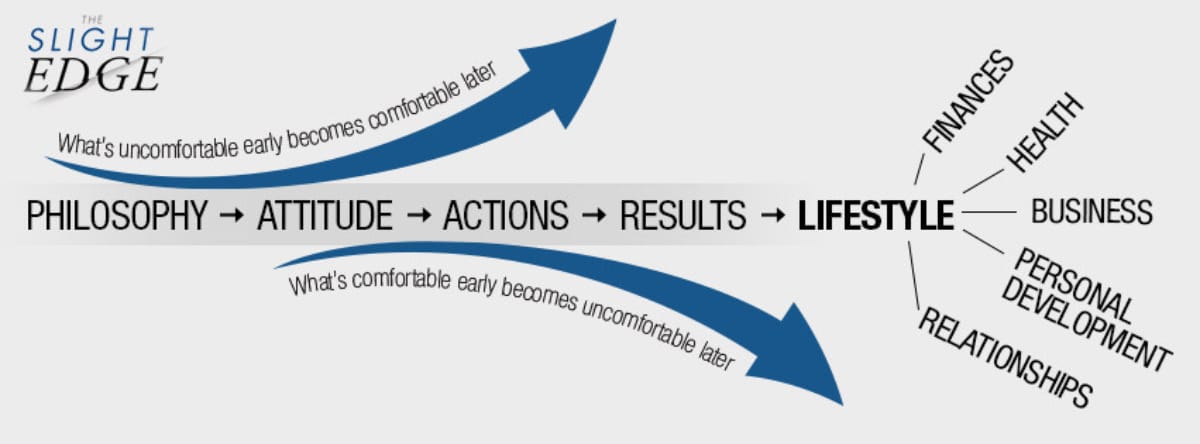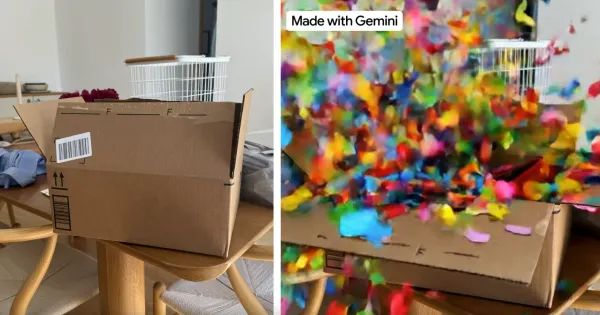[Small Choices, Big Wins] The Slight Edge Philosophy
![Cosmico - [Small Choices, Big Wins] The Slight Edge Philosophy](/content/images/size/w1200/2024/05/the_slight_edge_jeff_olson_2024_cosmico_business_tech_insights.jpg)
The Slight Edge Philosophy is a way of living that emphasizes how small, everyday decisions can lead to success or failure. The idea, popularized by Jeff Olson in "The Slight Edge", suggests that consistent, simple actions over time create significant results. This concept highlights that success comes from routine and consistency, not grand efforts.
This philosophy, rooted in ancient wisdom and modern personal development, teaches that small, easy-to-do habits—like waking up earlier, reading a few pages, or saving small amounts—can compound into large rewards. We will explore how applying The Slight Edge in daily life can drive personal and professional growth.
The Concept of Compound Actions

The Power of Incremental Improvements
The essence of The Slight Edge Philosophy lies in the power of incremental improvements. Imagine a scenario where two people make slightly different choices: one decides to read for 15 minutes each day, while the other chooses not to. Initially, there might not seem to be any significant difference between the two. However, compounded over a year, the first person has gained over 90 hours of reading, which can equate to numerous books and a considerable expansion of knowledge and perspective. This is the power of compound actions—small, consistent efforts that accumulate into significant advantages over time.
Scientific Backing of Compound Actions
Behavioral science supports the notion that small, consistent habits are more sustainable and effective for long-term growth than occasional, intense bursts of effort. According to studies in habit formation, once a small action becomes a habit, it requires less mental effort to maintain, making it more likely to stick and continue yielding results. This effectiveness is partly due to the 'compounding effect,' a concept widely recognized in economics and now increasingly applied to personal development and growth strategies.

Real-Life Examples
- Health: Consider someone who chooses to replace one sugary drink with water each day. The caloric deficit created over time can lead to significant weight loss and health improvements.
- Wealth: Regular, small investments in a diversified portfolio can grow significantly due to the compound interest effect, turning modest savings into substantial retirement funds.
- Skills: Daily practice of a musical instrument for just 30 minutes can, over years, turn a novice into a proficient musician.
These examples illustrate how seemingly minor choices can set the stage for major life improvements. This principle of accumulating positive outcomes through regular, small efforts forms the bedrock of applying The Slight Edge Philosophy to personal life.
Application in Personal Life

Health and Wellness
Adopting The Slight Edge Philosophy for health and wellness revolves around making small, manageable changes that you can maintain over the long term. Instead of radical diets or extreme fitness regimens, the focus is on incremental improvements. For instance:
- Incremental Nutrition: Switching one daily snack from something processed to a piece of fruit can drastically improve nutritional intake over time.
- Consistent Exercise: Adding just a few minutes of exercise to your daily routine can enhance physical fitness, mood, and overall health without the daunting commitment of lengthy workout sessions.
These choices, when made consistently, do not just contribute to immediate well-being; they compound into a lifetime of better health.
Personal Finance
The principles of The Slight Edge can transform personal finance habits from precarious to powerful. Key strategies include:
- Regular Saving: Even small amounts saved regularly can grow significantly due to compound interest. Starting with saving just 1% of your income and gradually increasing it can make a substantial impact.
- Investing Wisely: Making regular, small investments in low-cost index funds is a practical application of The Slight Edge, enabling the average person to benefit from market growth over decades.
By consistently applying these small efforts, you can build financial security and wealth incrementally without feeling overwhelmed.
Relationships
Maintaining and nurturing relationships also benefits from The Slight Edge Philosophy. Small, consistent gestures of kindness, communication, and understanding can strengthen bonds over time. Consider:
- Daily Affirmations: Telling your partner something you appreciate about them every day can significantly enhance the emotional connection.
- Regular Check-ins: A quick call or text to a friend regularly can keep relationships alive and prevent drifting apart due to busy schedules.
These efforts, though small, play a crucial role in building and sustaining strong, supportive relationships.
Application in Professional Life

Career Development
In career development, The Slight Edge Philosophy emphasizes the value of continuous, incremental learning and skill enhancement. Here’s how you can apply this concept:
- Daily Learning: Dedicate at least 15 minutes a day to learning something new related to your field. This could be through reading, online courses, or podcasts.
- Feedback Incorporation: Regularly seek feedback on your work and use it constructively to make small improvements regularly.
These small steps can lead to significant advancements in your professional capabilities and open up new career opportunities.
Leadership and Management
For leaders and managers, applying The Slight Edge means focusing on building a positive team culture through consistent, daily actions:
- Daily Encouragement: A simple daily habit of acknowledging the hard work of team members can boost morale and productivity.
- Consistent Communication: Keeping lines of communication open with regular check-ins can help in preempting issues and fostering a culture of openness and trust.
These practices help in building a robust team dynamic that can significantly enhance overall productivity and workplace satisfaction.
Entrepreneurship
Entrepreneurs can leverage The Slight Edge Philosophy by focusing on iterative improvements and resilience:
- Continuous Improvement: Regularly refine your products or services based on customer feedback, no matter how small the tweaks may seem.
- Resilience Building: Develop the habit of reviewing daily outcomes and learning from both successes and failures to foster resilience.
By persistently applying these small, consistent efforts, entrepreneurs can drive their ventures toward long-term success and sustainability.
Tools and Techniques to Implement The Slight Edge Philosophy

Goal Setting and Tracking Progress
Effective application of The Slight Edge Philosophy starts with clear goal setting and diligent tracking of progress. Here’s how to do it:
- Specific Goals: Set specific, measurable goals that align with your slight edge actions. For example, if your goal is to improve health, define what success looks like (e.g., lose 10 pounds, reduce cholesterol levels).
- Progress Journaling: Maintain a daily or weekly journal to document your actions and track progress towards your goals. This helps in recognizing patterns and adjusting strategies as needed.
Mindfulness and Daily Decision-Making
Mindfulness plays a critical role in The Slight Edge Philosophy, as it allows you to be conscious of your daily choices. Techniques include:
- Daily Reflections: Spend a few minutes each day reflecting on your decisions and their alignment with your long-term goals.
- Mindfulness Exercises: Practice mindfulness exercises like meditation or deep breathing to enhance your focus and decision-making capabilities.
Leveraging Resources
Utilizing external resources can provide additional support and guidance in your Slight Edge journey:
- Books and Podcasts: Engage with books and podcasts that reinforce the principles of The Slight Edge and provide inspiration and new ideas.
- Mentorship: Seek mentors who embody The Slight Edge Philosophy. Regular interactions with a mentor can provide motivation and insights into effective application of the philosophy in real life.
Technology Aids
Technology can also support your Slight Edge efforts, particularly in tracking and habit formation:
- Apps: Use apps designed for habit tracking, goal setting, and productivity to keep your slight edge actions on track.
- Online Communities: Join online forums or communities focused on personal development, where you can share experiences and learn from others applying The Slight Edge.
Challenges and Overcoming Them

Common Challenges in Maintaining Consistency
Implementing The Slight Edge Philosophy isn't without its challenges. Common obstacles include:
- Lack of Immediate Results: Since results are not immediate, it can be discouraging to continue with small actions that seem to make no difference in the short term.
- Daily Distractions: Everyday distractions can derail even the most well-intentioned efforts towards small, consistent actions.
Strategies to Overcome Procrastination and Lack of Motivation
To combat these challenges, consider the following strategies:
- Visual Reminders: Keep your goals visible in your daily environment to remind you of what you are working towards. Whether it's a vision board, goal list, or digital reminders, make sure they are in a place you can't ignore.
- Small Wins Recognition: Celebrate small achievements regularly. This can include acknowledging a week of completed tasks or a month of consistent gym attendance. Recognizing these wins can provide motivation to keep going.
Recalibrating When Off Track
Getting back on track after a setback is crucial. Here’s how you can recalibrate:
- Reset Goals: If you find yourself consistently failing to meet your goals, it may be time to reassess and set more realistic or different goals.
- Incremental Changes: If a particular slight edge action is not working, adjust it incrementally rather than overhauling your approach completely. Sometimes, a slight modification is all that’s needed.
Building Resilience
Finally, building resilience is key to maintaining the slight edge over the long term:
- Mindset Shift: Cultivate a growth mindset where challenges are seen as opportunities to learn rather than setbacks.
- Support System: Build a support system of friends, family, or colleagues who understand and support your goals. Sharing your journey can make it easier to stay on track.
Long-term Impacts and Sustainability

The Importance of Resilience and Adaptability
The Slight Edge Philosophy isn't just about implementing small daily habits but also about adapting them to changing circumstances and sustaining them over a lifetime. Resilience and adaptability are crucial for long-term success. Here's how these qualities impact your journey:
- Resilience: Enables you to bounce back from setbacks and continue applying The Slight Edge principles even when results aren't immediately evident.
- Adaptability: Allows you to modify your actions as your circumstances change, ensuring that your efforts remain relevant and effective.
Maintaining The Slight Edge in Changing Environments
As life evolves, so must your application of The Slight Edge Philosophy. Here are key considerations:
- Regular Review and Adjustment: Periodically review your goals and the methods you are using to achieve them. This helps ensure that your actions are still aligned with your objectives and are adapted to any new life circumstances.
- Lifelong Learning: Embrace the concept of lifelong learning to continually adapt and apply new knowledge to your efforts. This keeps you agile and prepared for changes in your personal and professional environments.
Future Trends in Personal and Professional Growth Strategies
The future of personal and professional growth will likely emphasize even more the importance of resilience, adaptability, and continuous improvement. Anticipating these trends, consider the following:
- Technological Integration: As technology advances, integrating digital tools for self-improvement, tracking, and habit formation will become more prevalent. Staying updated with these tools can enhance your ability to maintain the slight edge.
- Emphasis on Mental Health: Future trends will likely place a greater emphasis on balancing productivity with mental health. The Slight Edge Philosophy can help by promoting gradual changes and stress management techniques that are sustainable over time.
Final Thoughts
Embracing The Slight Edge Philosophy means recognizing that every small decision counts. By making intentional choices daily, you can create a powerful trajectory toward success and fulfillment. It’s not about overnight transformation but about gradual, consistent growth that accumulates to produce significant life results.
By adopting this philosophy, you prepare yourself not just for temporary achievements but for a sustained, fulfilling journey of personal and professional excellence.
Key Takeaways
| Section | Key Takeaways |
|---|---|
| Introduction | Daily small decisions are crucial for long-term success. |
| Concept of Compound Actions | Small, repeated actions build up and lead to big results over time. |
| Application in Personal Life | Consistent small habits improve health, finances, and relationships. |
| Application in Professional Life | Regular learning and steady habits are key to career and business success. |
| Tools and Techniques | Use goal setting, mindfulness, and technology to keep up with small daily actions. |
| Challenges and Overcoming Them | Embrace small victories, adjust goals when needed, and develop resilience. |
| Long-term Impacts and Sustainability | Stay resilient and adaptable to keep using the slight edge as life changes. |
Top Quotes from The Slight Edge
- "The difference between success and failure is not dramatic. In fact, the difference between success and failure is so subtle, so mundane, that most people miss it."
- "Simple daily disciplines—little productive actions, repeated consistently over time—add up to the difference between failure and success."
- "Successful people do what unsuccessful people are not willing to do."
- "It’s easy to do. And it’s easy not to do. The difference between success and failure is doing something the majority of people don’t do."
- "You can always count on the future being better than the past, if you’re willing to make the present better than the past."
- "The slight edge is relentless. It works for you or against you every day. And it never stops working."
- "The path to success is through a continuum of mundane, unexciting, and sometimes difficult daily disciplines compounded over time."
- "There are two kinds of habits: those that serve you, and those that don’t."
- "What you do today matters. What you do every day matters."
- "The simple things that lead to success are all easy to do. But they’re also just as easy not to do."





